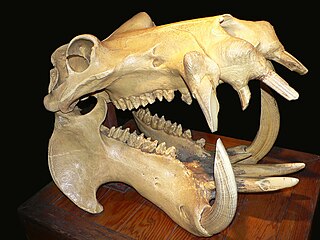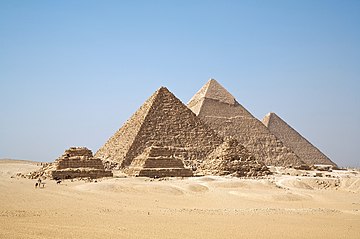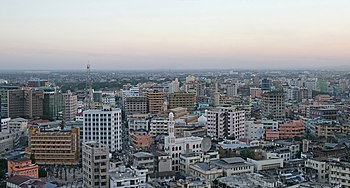Portal:Africa



Africa is the world's second-largest and second-most populous continent after Asia. At about 30.3 million km2 (11.7 million square miles) including adjacent islands, it covers 20% of Earth's land area and 6% of its total surface area. With nearly 1.4 billion people as of 2021, it accounts for about 18% of the world's human population. Africa's population is the youngest among all the continents; the median age in 2012 was 19.7, when the worldwide median age was 30.4. Based on 2024 projections, Africa's population will reach 3.8 billion people by 2099. Africa is the least wealthy inhabited continent per capita and second-least wealthy by total wealth, ahead of Oceania. Scholars have attributed this to different factors including geography, climate, corruption, colonialism, the Cold War, and neocolonialism. Despite this low concentration of wealth, recent economic expansion and a large and young population make Africa an important economic market in the broader global context. Africa has a large quantity of natural resources and food resources, including diamonds, sugar, salt, gold, iron, cobalt, uranium, copper, bauxite, silver, petroleum, natural gas, cocoa beans, and.
Africa straddles the equator and the prime meridian. It is the only continent to stretch from the northern temperate to the southern temperate zones. The majority of the continent and its countries are in the Northern Hemisphere, with a substantial portion and a number of countries in the Southern Hemisphere. Most of the continent lies in the tropics, except for a large part of Western Sahara, Algeria, Libya and Egypt, the northern tip of Mauritania, and the entire territories of Morocco, Ceuta, Melilla, and Tunisia, which in turn are located above the tropic of Cancer, in the northern temperate zone. In the other extreme of the continent, southern Namibia, southern Botswana, great parts of South Africa, the entire territories of Lesotho and Eswatini and the southern tips of Mozambique and Madagascar are located below the tropic of Capricorn, in the southern temperate zone.
Africa is highly biodiverse; it is the continent with the largest number of megafauna species, as it was least affected by the extinction of the Pleistocene megafauna. However, Africa also is heavily affected by a wide range of environmental issues, including desertification, deforestation, water scarcity, and pollution. These entrenched environmental concerns are expected to worsen as climate change impacts Africa. The UN Intergovernmental Panel on Climate Change has identified Africa as the continent most vulnerable to climate change.
The history of Africa is long, complex, and varied, and has often been under-appreciated by the global historical community. In African societies the oral word is revered, and they have generally recorded their history via oral tradition, which has led anthropologists to term them oral civilisations, contrasted with literate civilisations which pride the written word. During the colonial period, oral sources were deprecated by European historians, which gave them the impression Africa had no recorded history. African historiography became organized at the academic level in the mid-20th century, and saw a movement towards utilising oral sources in a multidisciplinary approach, culminating in the General History of Africa, edited by specialists from across the continent. (Full article...)
Selected article –

Saharan rock art is a significant area of archaeological study focusing on artwork carved or painted on the natural rocks of the central Sahara desert. The rock art dates from numerous periods starting c. 12,000 years ago, and is significant because it shows the culture of ancient African societies.
The paintings and carvings of the Sahara are endangered, and vulnerable rock art on uncovered rock has already disappeared. Organizations, such as the Trust for African Rock Art, are researching and recording as much information about Saharan rock art as possible, while raising awareness of threats to the art itself. (Full article...)
Featured pictures –
Did you know (auto-generated) -

- ... that when South African anti-apartheid activist Kay Moonsamy went into exile, it was fifteen years before he saw his wife and children again?
- ... that Alisha Kramer worked to fight HIV/AIDS, tuberculosis, and inequity in women's health in Africa and Europe as a program coordinator for the Center for Strategic and International Studies?
- ... that in 2022, Four Hundred Souls: A Community History of African America was a finalist for both an Andrew Carnegie Medal for Excellence in Nonfiction and an Audie Award for Multi-voiced Performance?
- ... that the Indianapolis African-American community raised $100,000 in just ten days in 1911 to establish the Senate Avenue YMCA?
- ... that South African mayor Marlene van Staden was re-elected through a coin toss?
- ... that before writing The Space Museum, Glyn Jones had never seen Doctor Who?
Categories
Selected biography –
Ahmed Hassan Zewail (February 26, 1946 – August 2, 2016) was an Egyptian-American chemist, known as the "father of femtochemistry". He was awarded the 1999 Nobel Prize in Chemistry for his work on femtochemistry and became the first Egyptian and Arab to win a Nobel Prize in a scientific field, and also first African to win a Nobel Prize in Chemistry. He was the Linus Pauling Chair Professor of Chemistry, a professor of physics, and the director of the Physical Biology Center for Ultrafast Science and Technology at the California Institute of Technology. (Full article...)
Selected country –
 |
 |
|

| ||
Ethiopia (Ge'ez: ኢትዮጵያ ʾĪtyōṗṗyā), officially the Federal Democratic Republic of Ethiopia, is a country situated in the Horn of Africa that has been landlocked since the independence of Eritrea in 1993. Apart from Eritrea to the north, Ethiopia is bordered by Sudan to the west, Kenya to the south, Djibouti to the northeast, and Somalia to the east.
Ethiopia is one of the oldest nations in the world and Africa's second-most populous nation. It has yielded some of the oldest traces of humanity, making it an important area in the process of human evolution. Historically a relatively isolated mountain empire, Ethiopia has more recently become an active member of the international community. It became a member of the League of Nations in 1923, signed the Declaration by United Nations in 1942, was one of the fifty-one original members of the United Nations (UN), founded the UN headquarters in Africa, has more than 60 embassies around the world, and currently hosts the headquarters of the African Union (formerly the Organisation of African Unity), of which it was the principal founder. (Read more...)
Selected city –

Juba (/ˈdʒuːbə/) is the capital and largest city of South Sudan. The city is situated on the White Nile and also serves as the capital of the Central Equatoria State. It is the most recently declared national capital and had a population of 525,953 in 2017. It has an area of 52 km2 (20 sq mi), with the metropolitan area covering 336 km2 (130 sq mi).
Juba was established in 1920–21 by the Church Missionary Society (CMS) in a small Bari village, also called Juba. The city was made as the capital of Mongalla Province in the late 1920s. The growth of the town accelerated following the signing of the Comprehensive Peace Agreement in 2005, which made Juba the capital of the Autonomous Government of Southern Sudan. Juba became the capital of South Sudan in 2011 after its independence, but influential parties wanted Ramciel to be the capital. The government announced the move of the capital to Ramciel, but it is yet to occur. (Full article...)
In the news
- 12 February 2024 –
- Two boats collide on the Congo River near Kinshasa, Democratic Republic of the Congo; with the death toll remains unclear. (AP)
- 11 February 2024 – 2023 Africa Cup of Nations
- In association football, hosts Ivory Coast win their third Africa Cup of Nations by defeating Nigeria 2–1 in the final. Sébastien Haller scores the winning goal in the 81st minute. (The Guardian)
- 10 February 2024 – Somali civil war
- Four Emirati soldiers and a Bahraini military officer are killed, while ten other people are injured, when a soldier opens fire at a military base in Mogadishu, Somalia, before being killed in the ensuing shootout. Al-Shabaab claims responsibility. (AP)
- 10 February 2024 –
- A Eurocopter EC130 helicopter crashes near Nipton, California, United States, killing all the six people on board, including Nigerian banker Herbert Wigwe. (CBS News)
- 10 February 2024 – 2023–2024 Senegalese protests
- Violent protests occur in Senegal following an announcement by President Macky Sall that presidential elections have been delayed from February 25 to December 15. (Sky News)
- 9 February 2024 –
- At least 18 people are killed during a collision between a bus and a truck on a road in Kinshasa, Democratic Republic of the Congo. (AP)
Updated: 16:33, 14 February 2024
General images -
Africa topics
More did you know –
- ...that Iyabo Obasanjo-Bello, a Nigerian Senator from the People's Democratic Party, is the daughter of former President Olusegun Obasanjo?
- ...that the 2007 South Africa miners' strike, which impacted over 240,000 workers, was the first ever industry-wide miners' strike in the history of South Africa?
- ...that Seleh Leha, a town in Tigray Region in northern Ethiopia, was the site of a leprosarium built during the Italian occupation of East Africa and abandoned in 1941?
- ...that Sarir field, an oil field in Cyrenaica operated by the Arabian Gulf Oil Company (AGOCO), is considered to be the largest in Libya, with estimated oil reserves of 12 Gbbl (1.9×109 m3)?
Related portals
Major Religions in Africa
North Africa
West Africa
Central Africa
East Africa
Southern Africa
Associated Wikimedia
The following Wikimedia Foundation sister projects provide more on this subject:
-
Commons
Free media repository -
Wikibooks
Free textbooks and manuals -
Wikidata
Free knowledge base -
Wikinews
Free-content news -
Wikiquote
Collection of quotations -
Wikisource
Free-content library -
Wikispecies
Directory of species -
Wikiversity
Free learning tools -
Wikivoyage
Free travel guide -
Wiktionary
Dictionary and thesaurus























































































